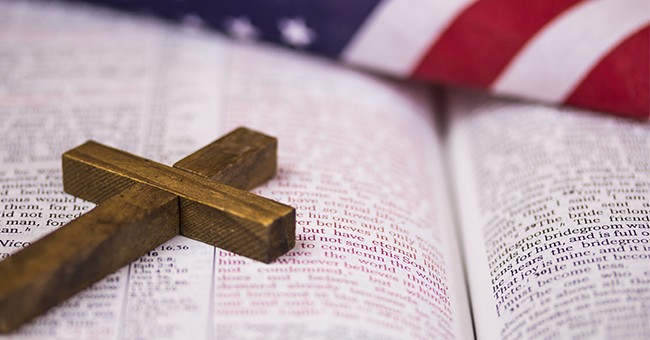Best-selling author of "Islam's Exceptionalism" and widely-read journalist Shadi Hamid, himself a Muslim, writes in The Atlantic, "As religious faith has declined, ideological intensity has risen. Will the quest for secular redemption through politics doom the American idea?"
Hamid sees an America that is shifting its hope from religion to politics?
Is he right?
As both our culture and evangelicalism itself are being torn by two very different competing views regarding speaking Truth to the culture, would God prefer His people simply shut up and be nice?
Or, stand up and be heard? And be nice?
A closer look.
Be informed, not misled.
Hamid's family is from Egypt. Both he and his family are Muslim. But he raises a few questions that are worthy of a closer look.
In his article, "America Without God" he notes that America has "long been a holdout among Western democracies, uniquely and perhaps suspiciously devout."
He says "from 1937 to 1998 church membership remained relatively constant, hovering at about 70%. Then something happened. Over the past two decades, that number has dropped to less than 50%, the sharpest recorded decline in American history. Meanwhile the 'nones'---atheists, agnostics, and those claiming no religion---have grown rapidly and today represent a quarter of the population."
There are a number of surveys and studies that show there has not been a 50% decline in Christian faith in America, but rather a shift in how people, especially younger people, express their faith, answer questions on polls regarding "church membership", etc., which seeds these polls he's referring to, but that's not my focus.
There is no question things are changing.
Hamid concludes,
"As Christianity's hold, in particular, has weakened, ideological intensity and fragmentation have risen. American faith, it turns out, is as fervent as ever; it's just that what was once religious belief has been merged with political belief."
Unfortunately, in some cases that's true.
When the spirit of politics and the spirit of the Christian faith collide.
Michael Brown wrote an article on the difference between the political spirit and the Christian spirit.
He rightly points out that Christians should and must be involved in speaking to cultural issues. Followers of Jesus should vote and be politically informed, biblical Christians are to be "salt and light" in the decay and darkness of our culture---in every aspect of life, including politics, some Christians are, or will be called to become politicians---there are godly politicians in office today in both state and federal levels, hopefully, others will also feel called to politics.
Brown makes the distinction between the political spirit and the "Christian" spirit.
The political spirit has become immoral and ungodly, even in some cases while advocating for godly truth. It has become crass and inappropriate for Christians.
Machiavelli once said, "Politics have no relation to morals," and Ivern Ball has said, "A politician is a person who makes waves, then causes you to believe he is the only one who can save the ship."
The profile of politics is that of a person who acts in a manipulative and devious way---think New York Governor Cuomo.
Something tragic has happened in our culture in recent years. The political tone and narrative have become almost unbearable. It's nasty, intended to smash, bask, demean, and destroy.
The political spirit aims to keep the people alarmed and fearful, and dependent, and often harbors hate.
The spirit of politics is often driven, not by principle but by personal ambition and a lust for power mixed with compromise and corruption.
James (3:15) refers to this as "wisdom from below"---"earthly, unspiritual, demonic."
The true Christian spirit of Christ is in stark contrast
Shadi Hamid does not make that distinction or see the contrast, because he does not personally know the one true God. We evangelicals do.
He suggests that the spirit of Christianity has been "merged with the spirit of politics." Again failing to contrast deeply held values and principles, with deeply held political and policy beliefs.
Christians must be careful not to mistakenly merge our political views with our political views. They are related, but different.
The gospel of Jesus Christ must be first and foremost. Politics must be second. Our deeply held spiritual, biblical views must always guide our political views. The two are not synonymous or interchangeable.
The message of the gospel is that by grace through faith sinners can be reconciled with God (Eph. 2:7-8). This message transforms individuals and enables us to live godly lives.
Additionally, Christians are mandated by Scripture (Matt. 28:19,20) to share that gospel in all areas of life---including in politics.
I'll be talking more about why Christians must be involved in politics on our live radio program today. Please join. Here's how.
Three reasons Christians must care about politics.
- The Christian world's view speaks to all areas of life.
- Politics are unavoidable.
- Proper government restrains evil and promotes good.
Takeaway
Jeremiah 29:7 says:
"But seek the welfare of the city where I have sent you into exile, and pray to the Lord on its behalf, for in its welfare you will find your welfare."
The city? Babylon.
Good government promotes literacy, protects its citizens, advances just laws, and protects God-given freedom and liberty.
And it enhances the opportunity to share the gospel with the culture.
Christian witness in the public square contributes transcendent biblical values about moral and ethical issues.
We cannot, we must not withdraw as some are advocating, because politics are "dirty."
We must carry on the contest, in the spirit of the Lord, rather than the filthy culture of politics.
Be Informed. Be Discerning. Be Vigilant. Be Prayerful.


